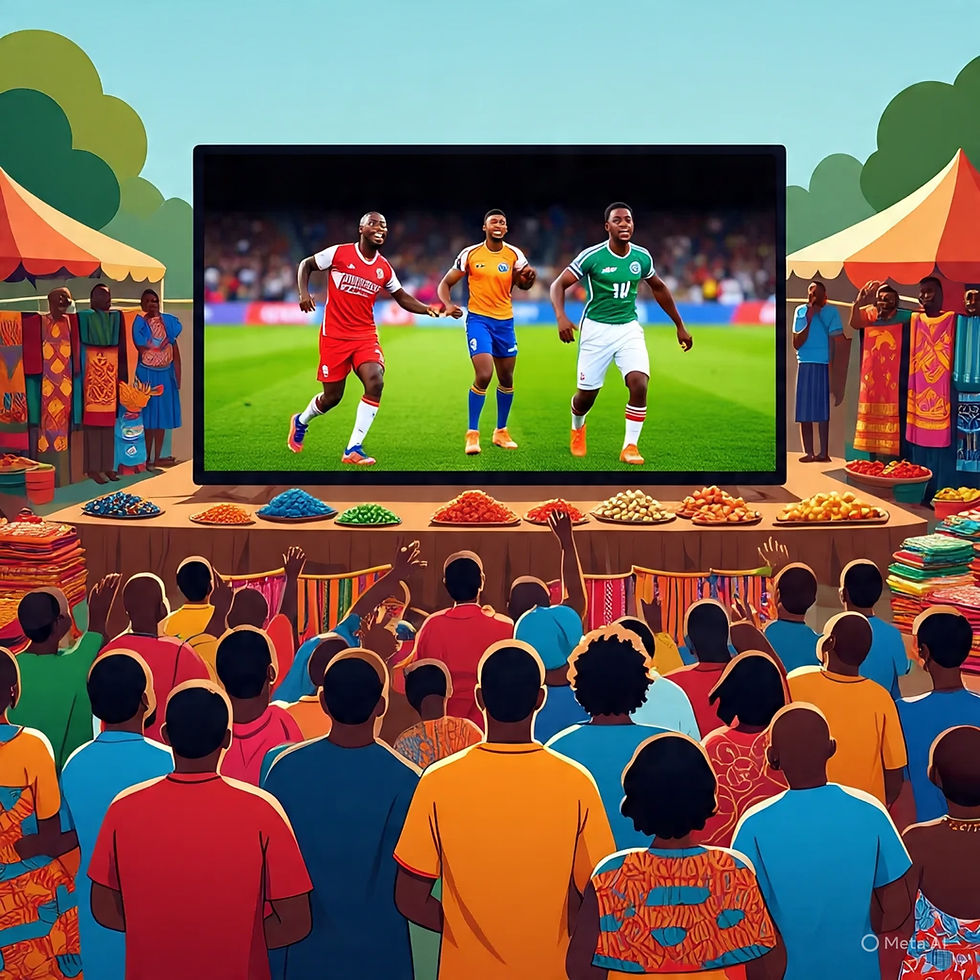Exploring Ghana’s Vibrant Festivals: Economic Impact, Social Significance, and Global Lessons
- orpmarketing
- May 14, 2025
- 6 min read

Ghana, often hailed as the "Gateway to Africa," is a cultural mosaic with over 100 ethnic groups, each contributing to a rich tapestry of festivals that draw both local and international visitors. These festivals are more than just celebrations; they are pivotal to Ghana’s economy, social cohesion, and global cultural identity. From the colorful Homowo to the dynamic Afrofuture, Ghana’s festivals are economic engines, cultural showcases, and community builders. This blog explores the major festivals in Ghana, their socioeconomic impacts, and how they compare to festivals across Africa and the world, while offering insights on how Ghana can elevate its festival tourism to new heights.
Major Festivals in Ghana
Homowo Festival (Ga People, Greater Accra Region)Celebrated annually in May, Homowo, meaning "hooting at hunger," is a harvest festival of the Ga people. It commemorates overcoming famine with vibrant street dances, music, and feasts. The festival features traditional dishes like kpokpoi (maize meal) and palm nut soup, alongside processions of chiefs and community members.
Akwasidae Festival (Ashanti People, Kumasi)Held every six weeks, Akwasidae is a sacred Ashanti festival honoring ancestors and the Golden Stool, the spiritual symbol of the Ashanti Kingdom. The durbar, a grand procession of chiefs adorned in kente cloth and gold jewelry, is a highlight, accompanied by drumming and dancing.
Kwahu Easter Festival (Kwahu People, Eastern Region)Originally a religious event, the Kwahu Easter Festival has evolved into a major tourism draw, especially since the introduction of paragliding in 2005. It features street carnivals, highlife music, health walks, and a durbar of chiefs, attracting thousands of revelers annually.
Aboakyer Festival (Effutu People, Central Region)This May festival, also known as the "deer-catching festival," involves two Asafo warrior groups competing to capture a live antelope as an offering to the deity Penkye Otu. It showcases traditional warrior attire, music, and dance, blending spirituality with community pride.
Afrofuture Festival (Accra)Formerly Afrochella, this modern music and culture festival held in December celebrates African music, art, and fashion. It attracts international tourists, particularly from the African diaspora, and features top artists, fostering a global connection to Ghanaian culture.
Chale Wote Street Art Festival (Accra)Held annually in August, Chale Wote transforms Accra’s Jamestown into a vibrant hub of street art, music, dance, and performances. It celebrates Ghana’s contemporary art scene and draws a diverse crowd of creatives and tourists.
PANAFEST (Cape Coast)The Pan-African Historical Theatre Festival, held biennially, focuses on the African diaspora and the legacy of the slave trade. It includes performances, historical tours, and cultural exchanges, promoting unity and heritage tourism.
Economic Significance and Impact on Society
Economic Contributions
Ghana’s festivals are significant economic drivers, particularly through tourism. The Kwahu Easter Festival, for instance, is estimated to contribute approximately US$3 billion to Ghana’s GDP, making tourism the fourth-highest foreign exchange earner for the country. Festivals stimulate local economies by increasing revenue from accommodation, food, transportation, and souvenirs. The influx of tourists during events like Afrofuture and Chale Wote boosts hospitality, retail, and event management sectors, creating both temporary and permanent jobs.
Foreign Exchange Earnings: Tourism, driven by festivals, contributes over 9% to Ghana’s GDP. Events like PANAFEST and Afrofuture attract international visitors, particularly from the African diaspora, bringing in substantial foreign currency.
Job Creation: Festivals generate seasonal employment for vendors, tour guides, drivers, hoteliers, and event organizers. For example, the Kwahu Easter Festival supports jobs in sales, hospitality, and telecom services.
Infrastructure Development: Festival seasons often prompt infrastructure upgrades, such as road repairs, new event centers, and enhanced hospitality facilities, benefiting both locals and tourists.
Social Impact
Festivals in Ghana strengthen community bonds and cultural identity. Homowo and Akwasidae reinforce traditional values, connecting younger generations to their heritage through rituals, music, and dance. The Kwahu Easter Festival enhances social cohesion through communal activities like health walks and cultural exchanges. PANAFEST fosters a sense of pan-African unity, linking Ghanaians with the global African diaspora.
However, festivals also face challenges. Commercialization can erode cultural authenticity, as seen in the shift of Kwahu Easter from a religious to a secular event. Increased tourism may lead to environmental strain, higher living costs, and potential cultural dilution if not managed sustainably.
Comparison with Festivals in Africa and Worldwide
African Festivals
FESTAC (Nigeria): The Festival of Arts and Culture in Nigeria is a pan-African event similar to PANAFEST, focusing on cultural heritage and unity. Like PANAFEST, it attracts international visitors but has faced challenges with funding and organization, limiting its global reach compared to Ghana’s festivals.
Sauti Za Busara (Zanzibar, Tanzania): This music festival draws international tourists with its focus on African music, akin to Afrofuture. However, its smaller scale and island location limit its economic impact compared to Ghana’s urban festivals.
Cape Town Jazz Festival (South Africa): This world-renowned festival generates significant revenue through ticket sales and tourism, similar to Afrofuture. Its success lies in robust marketing and corporate sponsorships, areas where Ghana could improve.
Global Festivals
Carnival in Rio de Janeiro (Brazil): Rio’s Carnival is a global benchmark for festival tourism, generating billions in revenue through elaborate parades, international media coverage, and corporate partnerships. Its scale dwarfs Ghana’s festivals, but its focus on cultural spectacle offers lessons for enhancing events like Homowo or Aboakyer.
Oktoberfest (Germany): This beer festival attracts millions, contributing significantly to Munich’s economy through tourism and hospitality. Its success stems from consistent branding, global promotion, and infrastructure investment, which Ghana could emulate to boost festivals like Chale Wote.
Glastonbury Festival (UK): Known for its music and cultural diversity, Glastonbury balances commercial success with community engagement, similar to Afrofuture. Its use of technology for ticketing and live streaming could inspire Ghana’s modern festivals.
Key Differences and Similarities
Scale and Infrastructure: Global festivals like Rio’s Carnival and Oktoberfest benefit from larger budgets, advanced infrastructure, and global media coverage, unlike most African festivals, including Ghana’s, which rely heavily on local resources.
Cultural Focus: Ghanaian festivals like Homowo and Akwasidae emphasize traditional rituals, similar to Nigeria’s FESTAC, but differ from the commercial focus of Oktoberfest or Glastonbury.
Economic Impact: While Ghana’s festivals contribute significantly to local economies, their global economic footprint is smaller compared to Rio’s Carnival or Oktoberfest due to limited international marketing and infrastructure.
Opportunities for Improvement in Ghana
To maximize the potential of its festivals, Ghana can learn from both African and global counterparts:
Enhanced Marketing and Global BrandingGhana could adopt Rio’s Carnival’s aggressive global marketing strategies, using digital platforms and partnerships with international media to promote festivals like Afrofuture and Chale Wote. Collaborating with influencers and diaspora communities, as seen during the 2019 Year of Return, can amplify reach.
Sustainable Tourism PracticesDrawing from global festivals, Ghana should implement eco-friendly measures like waste reduction and recycling, as suggested for general festival tourism. This would mitigate environmental impacts and appeal to eco-conscious tourists.
Infrastructure InvestmentLearning from Oktoberfest, Ghana could prioritize infrastructure upgrades, such as improved roads to tourist sites and modern event venues, to enhance visitor experiences. Collaboration between the Ghana Tourism Authority and local assemblies, as recommended for Kwahu, is key.
Balancing Commercialization and Cultural AuthenticityTo prevent cultural erosion, as seen in the Kwahu Easter Festival, Ghana should involve traditional leaders and communities in festival planning to preserve heritage, similar to Nigeria’s approach with FESTAC.
Technology IntegrationAdopting technologies like passive mobile data or RFID, as used in global festival studies, could help Ghana track visitor spending and preferences, improving economic impact assessments and event planning.
Stakeholder CollaborationGhana can emulate South Africa’s Cape Town Jazz Festival by fostering partnerships between government, private sector, and communities to fund and organize festivals, ensuring equitable economic benefits.
Conclusion
Ghana’s festivals, from the spiritual Akwasidae to the vibrant Afrofuture, are vital to its economy and cultural identity. They drive tourism, create jobs, and foster social cohesion, contributing significantly to foreign exchange earnings and infrastructure development. However, challenges like commercialization and environmental strain require strategic interventions. By learning from African festivals like FESTAC and global giants like Rio’s Carnival, Ghana can enhance its festival tourism through better marketing, sustainable practices, and infrastructure investment. With these improvements, Ghana’s festivals can not only preserve its rich heritage but also position the country as a global cultural tourism powerhouse, inviting the world to experience its vibrant traditions.




Comments